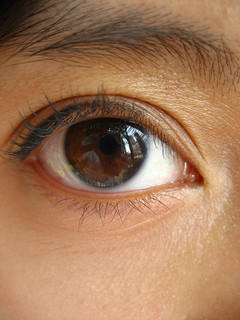If you have brown eyes, these fun facts may have you wanting to take a closer look at your peepers in your bathroom mirror at Radwyn Apartments. For one, a 2013 study involving 238 participants proved that people with brown eyes were perceived as more trustworthy than blue-eyed people. Want to learn more? Here are six more facts about brown eyes that may surprise you.
1. At one point in time, all humans had brown eyes. However, around six to ten thousand years ago, a genetic mutation occurred in the OCA2 gene that "switched off" a person's ability to produce pigment. That's right: Blue and other light-colored eyes are the result of a genetic mutation. This mutation is said to be traceable to a single person.
2. If you were a brown-eyed person living in Denmark, your eye color would be considered very rare, indeed. Only 11% of the population in Denmark has brown eyes! Brown eyes are most common in Southern Europe, North Africa, and Southwest Asia.
3. Do you have very light colored brown eyes? If so, your eye color is referred to as copper or honey.
4. Brown-eyed people are less sensitive to light than lighter-eyed people. Because of this, darker-eyed people are said to have quicker reaction times.
5. If two parents have brown eyes, it doesn't necessarily mean their child will follow suit. In many cases, the recessive gene for light eyes is passed along for generations before surfacing. A blue- or green-eyed child could still be in the cards!
6. Have you noticed that your brown eyes have started to look lighter? It could be due to the fact that, unlike skin and hair, eyes don't continuously produce melanin (pigment). Eyes can darken and lighten over time.
Blue-Eyed Humans Have A Single, Common Ancestor [Human N Health]
Human Eye Color Charts [All About Vision]
Reasons to Feel Good About Having Blue Eyes [Mental Floss]
Your Eye Color Reveals A Lot About You [Bit Rebel]
People With Brown Eyes Appear More Trustworthy, But That’s Not The Whole Story [Scientific American]


